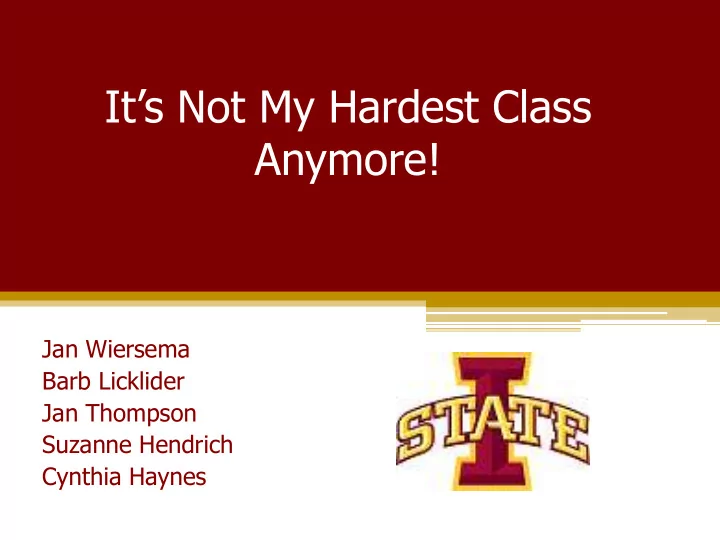

It’s Not My Hardest Class Anymore! Jan Wiersema Barb Licklider Jan Thompson Suzanne Hendrich Cynthia Haynes
Go ‘round Tell us your initial reaction to the following statement. There would likely be higher achievement if professors graded on effort.
Academy for Leadership and Learning Established in 2006 to help students develop learning, teamwork, and leadership skills. The curriculum was designed to emphasize: ▫ learning about learning, ▫ learning about self, ▫ purposeful development of community, and ▫ practice and refinement of skills to encourage growth of self and others.
What is mindset about intelligence?
Fixed Mindsets about Intelligence Individuals with fixed mindsets (Nicholls, 1984; Dweck, 2010), believe performance on a task reflects innate intelligence and ability. They believe that if they have ability, everything should come naturally.
Growth Mindsets about Intelligence Individuals with growth mindsets are more concerned with mastering the task and believe they can improve their skills with hard work. They tend to exert effort and persevere when they encounter setbacks.
Effort toward Learning While effort is widely acknowledged as a key in educational achievement (Marzano, Pickering, and Pollock, 2001, p. 49-53), the literature provides no definition of effort but typically equates it with time.
TTYP (Turn to your partner): What does effort mean to you? How do you know when learners are making the effort to learn as much as possible in your course?
Examine beliefs about learning Select strategies Engage in to address the reflection interference Identify most Identify factors challenging that interfere with It’s the thinking! class learning Monitor achievement Realize mindset during class matters! Examine Monitor beliefs about achievement mindset about outside of class intelligence
The key, then, is helping students understand that effort is the work of the mind — not time.
TTYP (Turn to your partner): Based on our work together, what are the implications for educators as they make plans to help students learn as much as possible.
Implications for educators Challenge students to confront beliefs about learning. Challenge students to confront beliefs about intelligence. Expect students to engage in meaningful and mindful effort. Provide tools that assist students in doing the kind of thinking expected. Hold students accountable for thinking. Provide a safe environment for learning. Encourage reflective thinking about experiences.
Closing go ‘round…. Tell us one thing you will take away from our work together today that will make a difference for your learners.
References: Dweck, C. (2010). Even geniuses work hard. Educational Leadership 68 (1), 16-20. Dweck, C. (2006). Mindset: The new psychology of success . New York: Random House. Marzano, R., Pickering, D., & Pollock, J. (2001). Classroom instruction that works: Research-based strategies for increasing student achievement. Alexandria, VA: ACSD. Nicholls, J. (1984). Achievement motivation: Conceptions of ability, subjective experience, task choice, and performance. Psychological Review 91 (3), 328-346.
Jan Wiersema janw@iastate.edu
Recommend
More recommend